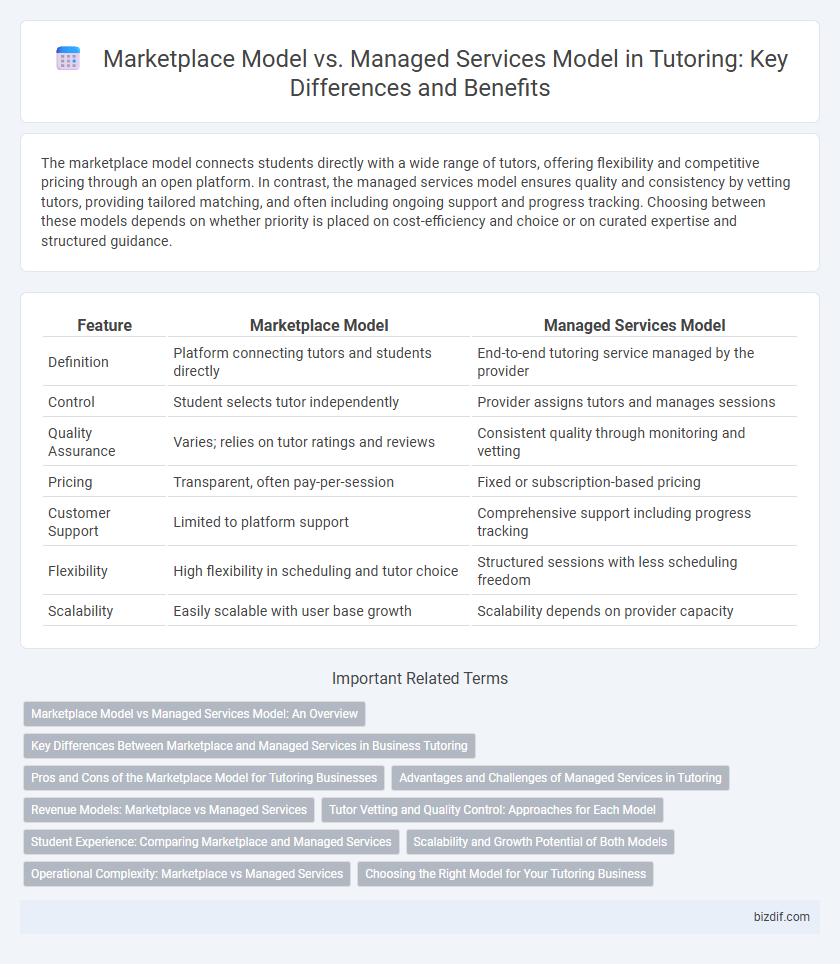The marketplace model connects students directly with a wide range of tutors, offering flexibility and competitive pricing through an open platform. In contrast, the managed services model ensures quality and consistency by vetting tutors, providing tailored matching, and often including ongoing support and progress tracking. Choosing between these models depends on whether priority is placed on cost-efficiency and choice or on curated expertise and structured guidance.
Table of Comparison
| Feature | Marketplace Model | Managed Services Model |
|---|---|---|
| Definition | Platform connecting tutors and students directly | End-to-end tutoring service managed by the provider |
| Control | Student selects tutor independently | Provider assigns tutors and manages sessions |
| Quality Assurance | Varies; relies on tutor ratings and reviews | Consistent quality through monitoring and vetting |
| Pricing | Transparent, often pay-per-session | Fixed or subscription-based pricing |
| Customer Support | Limited to platform support | Comprehensive support including progress tracking |
| Flexibility | High flexibility in scheduling and tutor choice | Structured sessions with less scheduling freedom |
| Scalability | Easily scalable with user base growth | Scalability depends on provider capacity |
Marketplace Model vs Managed Services Model: An Overview
The marketplace model in tutoring connects students directly with independent tutors, offering flexibility and a wide range of choices but requiring users to manage scheduling and quality. The managed services model provides a more structured approach with curated tutor selection, consistent quality control, and administrative support, albeit often at higher costs. Both models serve distinct needs: marketplaces emphasize user autonomy, while managed services prioritize reliability and convenience.
Key Differences Between Marketplace and Managed Services in Business Tutoring
The marketplace model in business tutoring connects independent tutors with learners through an online platform, emphasizing flexibility and a wide selection of experts. Managed services model offers a curated experience where the tutoring provider manages tutor selection, quality control, and progress tracking, ensuring consistent educational outcomes. Key differences include control over tutor quality, user experience, and accountability for learning results, with managed services providing more comprehensive support compared to the transactional nature of marketplaces.
Pros and Cons of the Marketplace Model for Tutoring Businesses
The marketplace model for tutoring businesses offers scalability and a broad tutor selection, enabling clients to compare profiles and reviews to find the best match. However, this model often struggles with quality control, inconsistent tutor availability, and challenges in ensuring standardized teaching methods. While it reduces operational overhead by outsourcing tutor management, businesses may face difficulties in maintaining brand reputation due to varied tutor performance.
Advantages and Challenges of Managed Services in Tutoring
Managed services in tutoring offer consistent quality control, streamlined scheduling, and expert tutor vetting, ensuring reliable student outcomes and enhanced parental trust. Challenges include higher operational costs, dependency on centralized management, and potential limitations in tutor availability or subject diversity. This model excels in scalability and accountability compared to the marketplace approach, which may face variability in service quality and coordination complexities.
Revenue Models: Marketplace vs Managed Services
The marketplace model in tutoring generates revenue primarily through commissions on transactions between tutors and students, often resulting in lower margins but higher transaction volume. The managed services model charges higher fees by offering curated, fully managed tutoring experiences, leading to increased customer retention and predictable recurring revenue. Both models leverage digital platforms but differ in scalability and revenue stability, with managed services favoring consistent cash flow over the transactional nature of marketplaces.
Tutor Vetting and Quality Control: Approaches for Each Model
The marketplace model relies on automated profiling and user reviews for tutor vetting, which allows scalable onboarding but may compromise consistent quality control. The managed services model implements rigorous pre-screening, continuous performance monitoring, and personalized training programs to ensure higher standards and accountability. This hands-on approach effectively maintains tutor quality through direct oversight and tailored support.
Student Experience: Comparing Marketplace and Managed Services
Marketplace tutoring platforms offer students a wide variety of tutor options, fostering personalized learning experiences and scheduling flexibility. Managed services models provide structured support, ensuring consistent quality through curated tutor matches and ongoing performance monitoring. Students in managed services often benefit from streamlined communication and tailored lesson plans, enhancing overall satisfaction and academic outcomes.
Scalability and Growth Potential of Both Models
The marketplace model in tutoring leverages a vast network of tutors, enabling rapid scalability and low operational overhead by connecting students directly with educators through a digital platform. The managed services model offers higher control and consistent quality by employing or closely managing tutors, which can limit scalability but enhances service reliability and customer satisfaction. Marketplaces can grow quickly by expanding user base and geographic reach, while managed services often focus on sustainable growth through quality assurance and personalized student engagement.
Operational Complexity: Marketplace vs Managed Services
The marketplace model in tutoring involves connecting students with numerous independent tutors, leading to higher operational complexity in coordinating schedules, quality control, and payment processing. In contrast, the managed services model centralizes tutor management, standardizing quality and simplifying logistics, which reduces operational challenges. This streamlined approach enables more efficient oversight and consistent student experiences compared to the decentralized nature of marketplace platforms.
Choosing the Right Model for Your Tutoring Business
Selecting the ideal model for your tutoring business depends on factors such as control, scalability, and client experience. The marketplace model offers flexibility and a broad reach by connecting tutors and students directly, while the managed services model provides curated, quality-assured tutoring with centralized management. Understanding your business goals and resources will help determine whether the marketplace's decentralized approach or the managed model's personalized service better suits your growth strategy.
marketplace model vs managed services model Infographic

 bizdif.com
bizdif.com